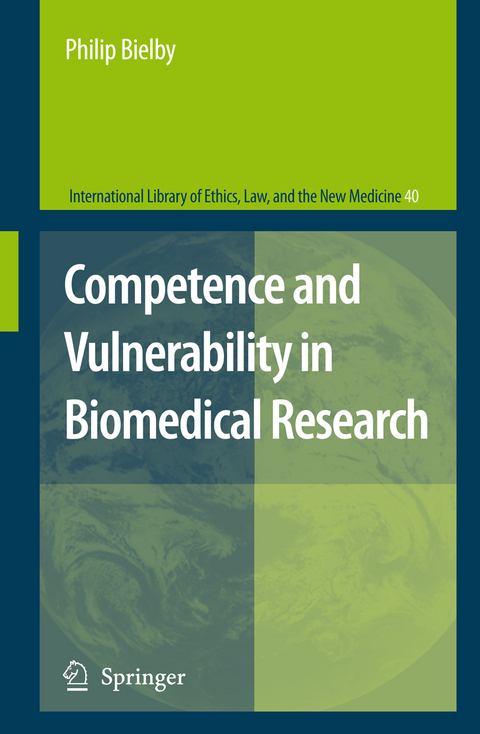
Competence and Vulnerability in Biomedical Research
Seiten
2010
|
Softcover reprint of hardcover 1st ed. 2008
Springer (Verlag)
978-90-481-7931-2 (ISBN)
Springer (Verlag)
978-90-481-7931-2 (ISBN)
This book develops a novel justificatory framework for making judgments of decisional competence to consent to biomedical research. This is the first book to focus exclusively on this subject, which also has implications for the emerging field of neuroethics.
Enhanced knowledge of the nature and causes of mental disorder have led increasingly to a need for the recruitment of ‘cognitively vulnerable’ participants in biomedical research. These individuals often fall into the ‘grey area’ between obvious decisional competence and obvious decisional incompetence and, as a result, may not be recognised as having the legal capacity to make such decisions themselves. At the core of the ethical debate surrounding the participation of cognitively vulnerable individuals in research is when, if at all, we should judge them decisionally and legally competent to consent to or refuse research participation on their own behalf and when they should be judged incompetent in this respect.
In this book, the author develops a novel justificatory framework for making judgments of decisional competence to consent to biomedical research with reference to five groups of cognitively vulnerable individuals - older children and adolescents, adults with intellectual disabilities, adults with depression, adults with schizophrenia and adults with dementia, including Alzheimer’s disease. Using this framework, the author argues that we can make morally defensible judgments about the competence or incompetence of a potential participant to give contemporaneous consent to research by having regard to whether a judgment of competence would be more harmful to the ‘generic rights’ of the potential participant than a judgment of incompetence. The argument is also used to justify an account of supported decision-making in research, and applied to evaluate the extent to which this approach is evident in existing ethical guidelines and legal provisions. The book will be of interest to bioethicists as well as psychiatrists and academic medical lawyers interested in normative questions raised by the concepts of competence and capacity.
Enhanced knowledge of the nature and causes of mental disorder have led increasingly to a need for the recruitment of ‘cognitively vulnerable’ participants in biomedical research. These individuals often fall into the ‘grey area’ between obvious decisional competence and obvious decisional incompetence and, as a result, may not be recognised as having the legal capacity to make such decisions themselves. At the core of the ethical debate surrounding the participation of cognitively vulnerable individuals in research is when, if at all, we should judge them decisionally and legally competent to consent to or refuse research participation on their own behalf and when they should be judged incompetent in this respect.
In this book, the author develops a novel justificatory framework for making judgments of decisional competence to consent to biomedical research with reference to five groups of cognitively vulnerable individuals - older children and adolescents, adults with intellectual disabilities, adults with depression, adults with schizophrenia and adults with dementia, including Alzheimer’s disease. Using this framework, the author argues that we can make morally defensible judgments about the competence or incompetence of a potential participant to give contemporaneous consent to research by having regard to whether a judgment of competence would be more harmful to the ‘generic rights’ of the potential participant than a judgment of incompetence. The argument is also used to justify an account of supported decision-making in research, and applied to evaluate the extent to which this approach is evident in existing ethical guidelines and legal provisions. The book will be of interest to bioethicists as well as psychiatrists and academic medical lawyers interested in normative questions raised by the concepts of competence and capacity.
Dr Phil Bielby is a lecturer in the Law School and a member of the Institute of Applied Ethics at The University of Hull. He holds a PhD from The University of Sheffield and has published in the fields of bioethics, medical law and critical legal education.
Five Concepts of Competence.- Consent, Vulnerability and Research.- Gewirth’s Theory of Agency Rights.- Proportionality, Precaution and Judgments of Competence.- The Competences of Cognitively Vulnerable Groups.- Cognitive Vulnerability and Consent to Biomedical Research.- Cognitive Vulnerability and Consent to Biomedical Research in England and Wales.- Cognitive Vulnerability and Consent to Biomedical Research in the United States.
| Erscheint lt. Verlag | 25.11.2010 |
|---|---|
| Reihe/Serie | "International Library of Ethics, Law, and the New Medicine " ; 40 |
| Zusatzinfo | XIV, 236 p. |
| Verlagsort | Dordrecht |
| Sprache | englisch |
| Maße | 155 x 235 mm |
| Themenwelt | Geisteswissenschaften ► Philosophie ► Allgemeines / Lexika |
| Geisteswissenschaften ► Philosophie ► Ethik | |
| Medizin / Pharmazie ► Medizinische Fachgebiete ► Psychiatrie / Psychotherapie | |
| Medizin / Pharmazie ► Physiotherapie / Ergotherapie ► Orthopädie | |
| Naturwissenschaften ► Biologie | |
| Recht / Steuern ► EU / Internationales Recht | |
| Recht / Steuern ► Privatrecht / Bürgerliches Recht ► Medizinrecht | |
| Technik ► Medizintechnik | |
| ISBN-10 | 90-481-7931-9 / 9048179319 |
| ISBN-13 | 978-90-481-7931-2 / 9789048179312 |
| Zustand | Neuware |
| Informationen gemäß Produktsicherheitsverordnung (GPSR) | |
| Haben Sie eine Frage zum Produkt? |
Mehr entdecken
aus dem Bereich
aus dem Bereich
die letzten Jahre der Philosophie und der Beginn einer neuen …
Buch | Hardcover (2024)
Klett-Cotta (Verlag)
28,00 €
Konfuzianismus, Daoismus, Buddhismus
Buch | Softcover (2023)
C.H.Beck (Verlag)
18,00 €


